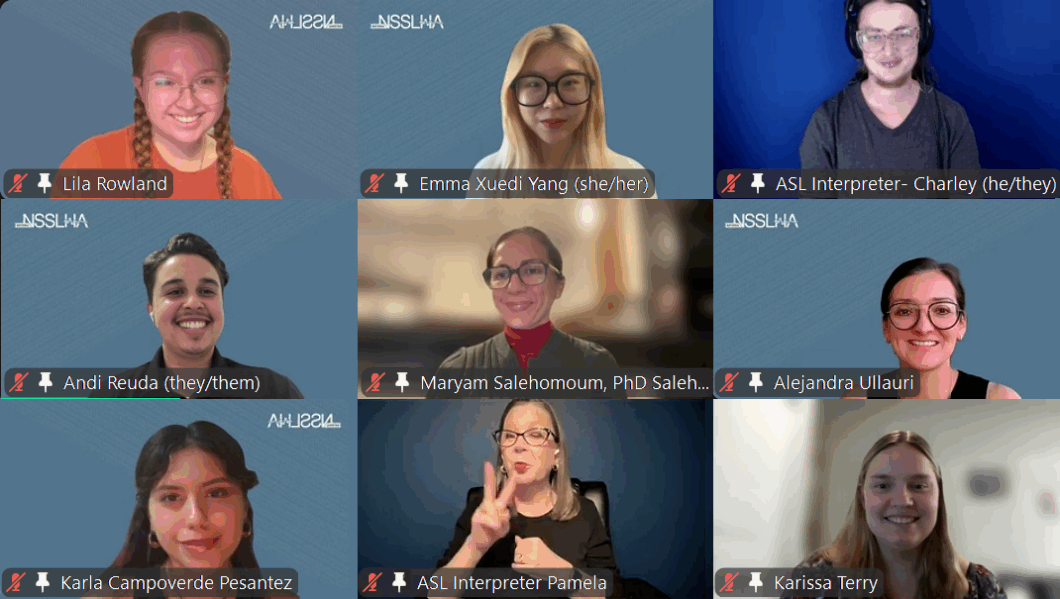Providing culturally and linguistically responsive care in speech-language pathology and audiology requires more than clinical knowledge: it requires awareness, flexibility, and intentional advocacy. In this Raw Conversations virtual event, multilingual clinicians and educators shared their experiences navigating diverse patient populations, leveraging their language skills, and finding support in the workplace. Here’s what they had to say. Watch the full recording below:
Personal Language Journeys and Career Impact
Panelists described how their language backgrounds shaped their career paths and professional identities. For some, bilingual skills directly created opportunities, such as leading initiatives like Audiology En Español or being recruited to roles that served diverse populations. Others incorporated their multilingual experiences into teaching and clinical work, using case examples of bilingual children to highlight assessment and intervention considerations. Across the panel, a common theme emerged: multilingual clinicians bring a unique ability to connect with patients, understand cultural contexts, and improve adherence to care recommendations.
Navigating Workplaces and Advocating for Yourself
While language skills are an asset, navigating professional environments can present challenges. Panelists emphasized the importance of transparency and advocacy—both for oneself and for patients. Being upfront about language proficiency and accommodations, such as ASL use or service dogs, helps ensure that clinicians are supported and that patients receive appropriate care. They also encouraged clinicians to recognize their limits, bringing in colleagues when unfamiliar cultural or linguistic situations arise. Professional engagement, including membership in ASHA’s multicultural constituency groups or online communities for bilingual clinicians, provides mentorship, resources, and networking opportunities that help clinicians thrive.
Addressing Workplace Challenges and Patient Needs
Multilingual clinicians frequently encounter workplaces or systems that are unprepared to fully support linguistic diversity. Panelists recommended addressing these situations directly, educating colleagues, and documenting patient experiences when accommodations are insufficient. Transparency about fluency is critical: conversational skills can enhance rapport and initial patient interactions, but clinicians must recognize when a higher level of proficiency is needed for accurate assessment and intervention. Even simple communication in a patient’s language can build trust, but effective, safe care depends on honesty about limitations.
Leveraging Resources and Building Cultural Competence
The panel highlighted numerous professional resources and communities for supporting multilingual practice. Validated assessment tools, culturally responsive guidelines, and continuing education opportunities help clinicians deliver competent care. Initiatives like the LEADERSproject from Teachers College provide free multilingual assessment materials and online CE courses. Panelists also recommended joining ASHA multicultural constituency groups, such as the MENA and API groups, which offer networking, newsletters, and research symposia. Resources like That’s Unheard Of, which provides practical strategies for serving culturally and linguistically diverse clients, can also help to assess and build upon cultural competence, while tools such as the Cultural Competence Checklist [PDF] allow for personal reflection. Most importantly, clinicians were reminded that patients themselves are the best source of information about cultural norms, preferences, and communication priorities—Google can inform, but patients guide practice.
Multilingual and culturally aware clinicians are vital to improving healthcare outcomes and patient trust. Honesty about language proficiency ensures safety and quality in care, while advocacy and education support both colleagues and patients. Professional communities provide mentorship and resources that strengthen practice, and cultural humility allows clinicians to provide respectful, patient-centered care.
Supporting multilingual practice in SLP and audiology is both challenging and rewarding. This panel reminded participants that learning is ongoing, growth takes time, and connecting with peers, mentors, and communities strengthens both professional development and patient care.

